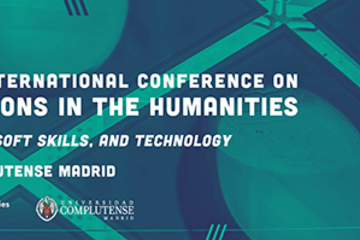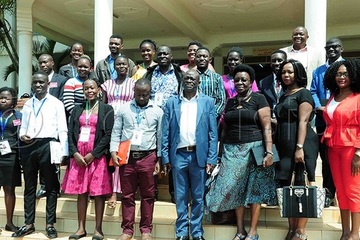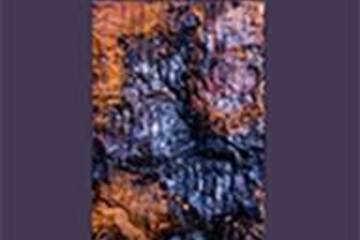Feed
-
CALL FOR PAPERSWe are pleased to share with you the Call for Papers for the Nineteenth International Conference on New Directions in the Humanities, Complutense University of Madrid, Madrid, Spain, 30 June - 2 July 2021.The New Directions in the Humanities Research Network is brought together by a common interest in established traditions in the humanities while at the same time developing innovative practices and setting a renewed agenda for their future. We seek to build an epistemic community where we can make linkages across disciplinary, geographic, and cultural boundaries. As a Research Network, we are defined by our scope and concerns and motivated to build strategies for action framed by our shared themes and tensions. The Nineteenth International Conference on New Directions in the Humanities features research addressing the following annual themes and special focus: 2021 Plenary Speakers The Nineteenth International Conference on New Directions in the Humanities will feature plenary sessions by some of the world’s leading thinkers and innovators in the field. Reimagining the Scholarly Conference Our mission is to provide a safe, sustainable, and accessible way for us to come together and interact as a Research Network. We are taking on these challenges by offering a blended conference experience, with session types explicitly designed to make the most of both online and place-based social knowledge processes. We are trying to move away from the either/or of place-based or online conferences. And at the same time be ready for the possibility of place based cancelation due to COVID-19. This way we build for our Research Network Members resilient spaces for communication, engagement, and participation. Follow this link to learn more and submit your proposal.By: Elaina LawrenceMonday, Aug 16, 2021EDUCATION

-
Check out these rising stars! Michigan Fellows Agribusiness Initiative (MFAI)Congratulations to the Michigan Fellows Agribusiness Initiative (MFAI) on receiving a Professional Fellows Program alumni award signifying your growth and continued success. We are delighted for the success of the 2nd Agribusiness Apprenticeship Program and can't wait to see how these young agribusiness professionals make their marks in Uganda and beyond. A special thanks to St. Lawrence University for hosting the training, the US Department of State Bureau of Educational and Cultural Affairs for its financial support, and to MFAI’s ongoing partners: the Empowerment Initiative for Women and Youth, Uganda; the US Mission in Kampala; Kyambogo University; and, the Africa 2000 Network, Uganda! https://www.newvision.co.ug/news/1536048/us-embassy-st-lawrence-university-partner-promote-agribusinessBy: Elaina LawrenceMonday, Aug 16, 2021EDUCATION

-
CFP: History in Africa 2022 "New Interdisciplinary Approaches to African History"History in Africa is seeking contributions that examine interdisciplinarity in African history in new ways. Interdisciplinarity happens across academia on multiple, overlapping levels including the use of methods from other disciplines, team-based collaborations (multidisciplinary), and the creation of new fields (transdisciplinary). As historians of Africa, we may engage in interdisciplinary work by doing ethnographic research or by maintaining an appointment in a multidisciplinary African Studies program. Meanwhile, at many of our institutions, there are pressures to establish new interdisciplinary majors, often in STEM, but also in the humanities and social sciences. How does this proliferation of interdisciplinary programming relate to us as historians? In particular, the editors are interested in how scholars are rethinking interdisciplinary methods while engaging with source materials. As historians, we have generally taken for granted our capacity to engage in interdisciplinary work, especially by working with anthropology, linguistics, or even archaeology (Zeleza 2007; Brizuela Garcia 2008). Yet, as historians of Africa we also rely on literature, visual arts, and, increasingly, digital media, in our scholarship and teaching. Are there ways in which interdisciplinarity in African history is being redefined by changing methodologies, archival materials, or sources? This CFP comes as the story of the post-World War II origins of African Studies and the role of scholars in a changing world faces new scrutiny. It is compelling that African Studies did not emerge on the scene in the 1950s as the story has often been told. Instead, African Studies began in the aftermath of the US Civil War as Black intellectuals and activists developed an interdisciplinary and pan-African outlook to their work that originally flourished at Historically Black Colleges and Universities. (James Pritchett, "Reflections on the State of African Studies," Presidential Lecture, ASA 2014, Indianapolis, IN) The theme of the 63rd ASA meeting that we just shared virtually called on us to recognize and confront these legacies of division and exclusion in African Studies. We must also respond to the range of twenty-first century movements calling for social justice on the African continent and in the Global North (Ampofo 2016). How do interdisciplinary frameworks provide different creative spaces to address these calls to action that also shape our work as historians of Africa? We invite contributions that address interdisciplinarity in African history in relation to methods, source analysis, and historiographical debates. As always, submissions that fall outside of the scope of this special section theme of interdisciplinary approaches are welcome. We also invite submissions for other features in our journal including Archival Reports,“Interview with an Archivist,” and “History from Africa” on a rolling basis. Please address any questions to the Managing Editor. Possible topics related to our interdisciplinary theme include: Theorizing interdisciplinary methods Promise and challenge of collaboration Interdisciplinary methods and public histories Redefining the discipline Linking Africa and its diasporas Interdisciplinarity and the digital humanities Racial justice and interdisciplinarity Centering Africa in interdisciplinary approaches SUBMISSION INSTRUCTIONS Please email a 500-word abstract to managingeditor@historyinafrica.org by February 15, 2021 with the subject line: HiA Abstract Submission 2022. By late February, authors will be notified whether to submit a full article for peer review by June 1, 2021. Please note that invitations to submit articles for peer review do not guarantee publication. Articles selected for publication after peer review will be included in the 2022 volume of History in Africa. Articles may appear in advance of the publication date via FirstView once the copy editing process is completed. Any queries should be addressed to Lorelle Semley at managingeditor@historyinafrica.org. Works Cited Paul Tiyambe Zeleza, “Introduction: The Disciplining of Africa,” in Zeleza, ed., The Study of Africa: Disciplinary and Interdisciplinary Encounters, vol. 1 (CODESRIA: Dakar, 2007), 1-35. Esperanza Brizuela-Garcia, “Towards a critical interdisciplinarity? African history and the reconstruction of universal narratives,” Rethinking History Vol. 12, No. 3, September 2008: 299–316. James Pritchett, “Reflections on the State of African Studies,” Presidential Lecture, ASA 2014, Indianapolis, IN, https://www.youtube.com/watch?v=cYxbYLgx32M Akosua Adomako Ampofo, “Re-Viewing Studies on Africa, #Black Lives Matter, and Envisioning the Future of African Studies,” African Studies Review, Vol. 59, No. 2 (September 2016): 7–29.By: Elaina LawrenceMonday, Aug 16, 2021EDUCATION
No Preview Available -
Webinar: Retrieving Women's Voices in African Political History 12/01/2020Since the 1970s, scholars have raised awareness about the gender biases of archival sources, especially when it comes to colonial, postcolonial, national or diplomatic archives. They have shown that women’s invisibility did not mean an absence of traces, and advocated innovative methodologies and the search for unusual sources to reconstruct women’s lost voices in African history. Our guest speakers work on African women's voices in various historical, geographical and more importantly political contexts, and with many different sources (public archives, literature, autobiographies...). They will share their insights on how to retrieve, create or re-interpret sources about women’s power and how to find new conceptual tools to complicate political narratives Speakers: Anna Adima (Doctoral researcher, University of York), Marciana Nafula Were (Lecturer, Tom Mboya University/Stellenbosch University) & Immanuel Harisch (Doctoral researcher, Department of African Studies, University of Vienna). The discussion will be informal (short presentation of archives/sources; Q&A). This working group doesn’t mean you have to work: just come join us to listen and/or contribute to a friendly discussion where students, researchers and professors are all welcome! Registration to access the online meeting here: https://www.eventbrite.com.au/e/beyond-silences-retrieving-womens-voices-in-african-political-history-tickets-132949793411By: Elaina LawrenceMonday, Aug 16, 2021EDUCATION
No Preview Available -
CFP: Entremons UPF Journal of World HistoryEntremons UPF Journal of World History invites you to submit an original text for its possible inclusion in the next issue of their journal. Entremons is an annual publication sponsored by the University Pompeu Fabra and accepts both academic articles and recently published books' reviews about World History. The texts that will be considered for publication should be sent to revista.entremons@upf.edu between January 1st and March 1st, 2021. Articles can be written in English, Spanish, or Catalan, and they must include a summary and keywords both in the original language and in English. Rules for citations can be found at their website www.entremons.orgBy: Elaina LawrenceMonday, Aug 16, 2021EDUCATION
 No Preview Available
No Preview Available -
Africa: How The Digital Revolution Can Help Level The Playing Field for African Women in AgricultureThe race to limit the spread of Covid-19 has, through necessity, accelerated many other transformations that were already under way, including the digital revolution in African agriculture. What had previously been a growing but limited shift towards the use of digital tools and technologies for food production and business has become a lifeline in the face of market restrictions, food insecurity and lockdowns. And among the biggest winners have been women. https://agra.org/news/africa-how-the-digital-revolution-can-help-level-the-playing-field-for-african-women-in-agriculture/By: Amy JamisonMonday, Aug 16, 2021AGRI-FOOD SYSTEMS
No Preview Available -
Ufahamu: A Journal of African StudiesCheck out the latest edition of Ufahamu: A Journal of African Studies! https://escholarship.org/uc/international_asc_ufahamu/42/1By: Elaina LawrenceMonday, Aug 16, 2021EDUCATION


Leave a comment